

History of Yule. Iranian Persian Festival of Yalda, Shab-e Yalda Celebration and Traditions, Night of Yalda Iranian Traditions, شب یلدا, Shab-e Cheleh History and Traditions, Christmas Celebration in Ancient Persia, Yalda a Christmas Celebration in Iran after Islam, Histo. Shab-e Yalda - شب یلدا - Yalda History and Traditions in Iran Yalda, a Syric word imported into the Persian language by the Syric Christians means birth (tavalud and melaad are from the same origin).
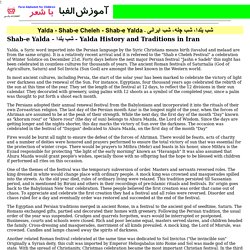
It is a relatively recent arrival and it is refereed to the "Shab e Cheleh Festival" a celebration of Winter Solstice on December 21st. Forty days before the next major Persian festival "Jashn e Sadeh" this night has been celebrated in countless cultures for thousands of years. Yaldā. For the demiurge, see Yaldabaoth The longest and darkest night of the year is a time when friends and family gather together to eat, drink and read poetry (especially Hafez) until well after midnight.
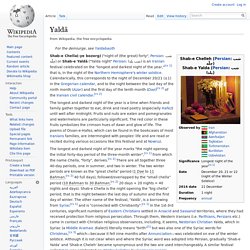
Fruits and nuts are eaten and pomegranates and watermelons are particularly significant. The red color in these fruits symbolizes the crimson hues of dawn and glow of life. The poems of Divan-e-Hafez, which can be found in the bookcases of most Iranians families, are intermingled with peoples' life and are read or recited during various occasions like this festival and at Nowruz. Yule. Twelve Days of Christmas. Many different saint feast days fall within the twelve days of Christmas, but they are not part of the Twelve Days themselves.
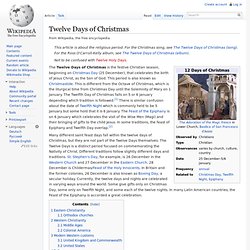
The Twelve Days is a distinct period focused on commemorating the Nativity of Christ. Different traditions follow slightly different days and traditions. St. Stephen's Day, for example, is 26 December in the Western Church and 27 December in the Eastern Church. 28 December is Childermas/Feast of the Holy Innocents. In Britain and the former colonies, 26 December is also known as Boxing Day, a secular holiday. Eastern Christianity[edit] Orthodox churches[edit] Magi - 3 Kings - Wisemen - Were the Wise Men who Visited Jesus in Bethlehem Persian? Saturnalia. In Roman mythology, Saturn was an agricultural deity who was said to have reigned over the world in the Golden Age, when humans enjoyed the spontaneous bounty of the earth without labor in a state of social egalitarianism.
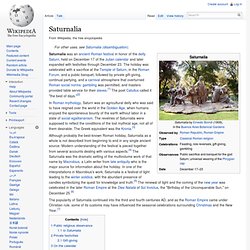
The revelries of Saturnalia were supposed to reflect the conditions of the lost mythical age, not all of them desirable. The Greek equivalent was the Kronia.[3] Although probably the best-known Roman holiday, Saturnalia as a whole is not described from beginning to end in any single ancient source. Modern understanding of the festival is pieced together from several accounts dealing with various aspects.[4] The Saturnalia was the dramatic setting of the multivolume work of that name by Macrobius, a Latin writer from late antiquity who is the major source for information about the holiday. Public religious observance[edit] The day was supposed to be a holiday from all forms of work.
Io Saturnalia[edit] Private festivities[edit] Dice players in a wall painting from Pompeii. The history of Christmas and how it began. I.

When was Jesus born? A. Popular myth puts his birth on December 25th in the year 1 C.E. B. The New Testament gives no date or year for Jesus’ birth. C. A. B. C. D. The True Origin of Christmas. The True Origin of Christmas By David C.
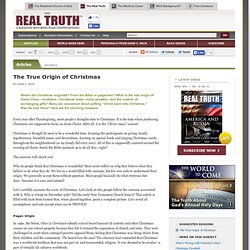
Pack Where did Christmas originate? From the Bible or paganism? What is the real origin of Santa Claus—mistletoe—Christmas trees—holly wreaths—and the custom of exchanging gifts? Every year after Thanksgiving, most people's thoughts turn to Christmas. Christmas is thought by most to be a wonderful time, focusing the participants on giving, family togetherness, beautiful music and decorations, feasting on special foods and singing Christmas carols throughout the neighborhood (as my family did every year). The True Origin of Christmas. Every year after Thanksgiving, most people’s thoughts turn to Christmas.
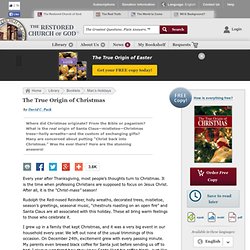
It is the time when professing Christians are supposed to focus on Jesus Christ. After all, it is the “Christ-mass” season! Rudolph the Red-nosed Reindeer, holly wreaths, decorated trees, mistletoe, season’s greetings, seasonal music, “chestnuts roasting on an open fire” and Santa Claus are all associated with this holiday. These all bring warm feelings to those who celebrate it. I grew up in a family that kept Christmas, and it was a very big event in our household every year. Christmas is thought by most to be a wonderful time, focusing the participants on giving, family togetherness, beautiful music and decorations, feasting on special foods and singing Christmas carols throughout the neighborhood (as my family did every year).
The answers will shock you! The Bible’s very greatest prophecies are on the threshold of fulfillment, with some already underway. Why do people think that Christmas is wonderful? Can a Christian celebrate Christmas? By Matt Slick Christmas is the most popular holiday in America.
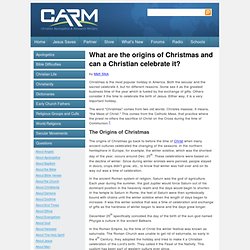
Both the secular and the sacred celebrate it, but for different reasons. Some see it as the greatest business time of the year which is fueled by the exchange of gifts. Others consider it the time to celebrate the birth of Jesus. Either way, it is a very important holiday. The word "Christmas" comes from two old words: Christes maesse.